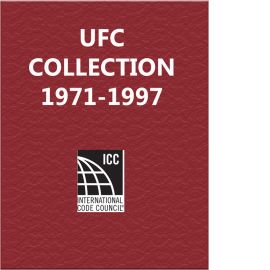This is a demo store. No orders will be fulfilled.
1997 Uniform Fire Code Volume I (Download)
PURCHASE THE PDF DOWNLOAD VERSION AND GET IMMEDIATE ACCESS!!! This convenient option is a searchable PDF download that requires a PDF Reader. This option is mobile friendly and compatible with all devices, including mobile tablets and smart phones. The PDF Download is licensed per individual in which the individual can place on up to four electronic devices for their personal use. Distribution of the PDF is not permitted. For a volume license the PDF is licensed to the person in which it is assigned. Use on a local area network or other network is not permitted.
ALL PDF DOWNLOAD SALES ARE FINAL.
For ICC certification examination rules related to exam reference materials review Test Site Regulations
The Uniform Fire Code (UFC) is the United States premier model fire code. Since its initiation in 1971, the code has become internationally recognized for its role in setting the pace of fire prevention, fire protection and public safety. Fire codes represent one of today's most rapidly changing regulatory arenas. New challenges presented by hazardous materials, flammable and combustible liquids, explosives, high-piled combustible storage, aerosol product storage and building operations are among the many issues shaping the future of fire prevention, fire protection and public safety. In addition, fire codes have evolved far beyond their traditional roles as maintenance codes, now addressing many issues related to new construction and special hazards in buildings. As a model code developed through a consensus code development process, the Uniform Fire Code provides jurisdictions with an opportunity to adopt a fire code which is comprehensive, up-to-date and consistent with codes of other jurisdictions. Adoption of the Uniform Fire Code also relieves jurisdictions from the burdensome process of independently developing regulations.
| Description: | The Uniform Fire Code (UFC) is the United States premier model fire code. Since its initiation in 1971, the code has become internationally recognized for its role in setting the pace of fire prevention, fire protection and public safety. Fire codes represent one of today's most rapidly changing regulatory arenas. New challenges presented by hazardous materials, flammable and combustible liquids, explosives, high-piled combustible storage, aerosol product storage and building operations are among the many issues shaping the future of fire prevention, fire protection and public safety. In addition, fire codes have evolved far beyond their traditional roles as maintenance codes, now addressing many issues related to new construction and special hazards in buildings. As a model code developed through a consensus code development process, the Uniform Fire Code provides jurisdictions with an opportunity to adopt a fire code which is comprehensive, up-to-date and consistent with codes of other jurisdictions. Adoption of the Uniform Fire Code also relieves jurisdictions from the burdensome process of independently developing regulations. |
|---|---|
| Code Year | 1997 |
| Language | English |

